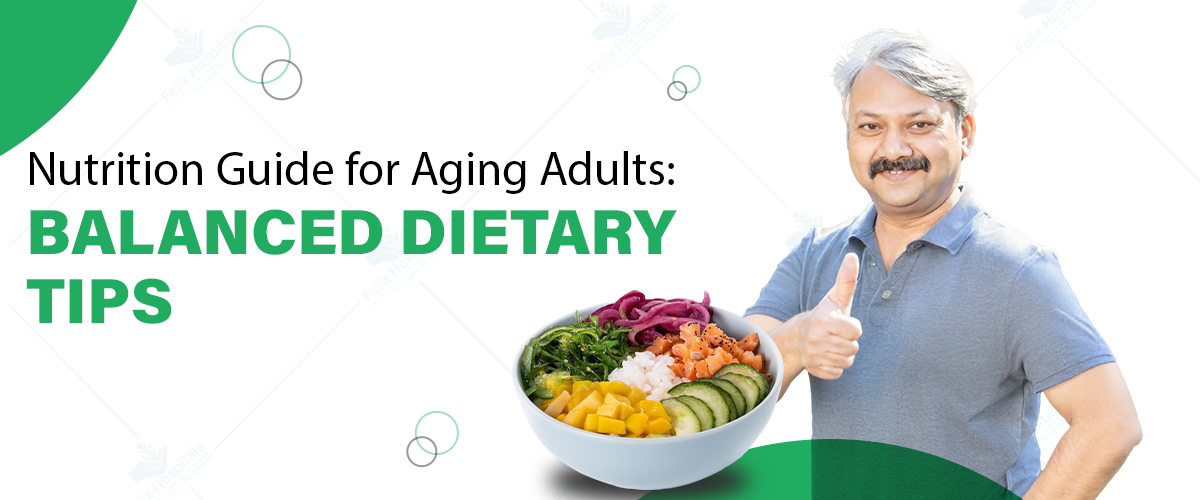
Subscribe to our

Aging brings about various physical, metabolic, and lifestyle changes that can impact nutritional needs and overall health. With the right dietary choices, older adults can support their health, maintain vitality, and manage age-related conditions effectively. In this guide on Dietary Needs for the Elderly, let’s explore essential dietary considerations, the importance of specific nutrients, and practical meal ideas to promote well-being in the later years of life. For those seeking specialized dietary guidance, Diet Hospital in Noida can provide tailored support to ensure older adults meet their unique nutritional needs.
Take Charge of Your Nutrition at Felix Hospitals. Embrace balanced nutrition for a happier, healthier tomorrow! Call us today at +91 9667064100.
As we age, our body’s physiology changes. The metabolism slows down, muscle mass may decrease, and the body’s ability to absorb and utilize nutrients can become less efficient. Proper nutrition helps mitigate these changes, supports cognitive health, maintains muscle strength, boosts immunity, and reduces the risk of chronic illnesses such as diabetes, cardiovascular disease, and osteoporosis.
1. Decreased Appetite: Aging can result in a reduced sense of taste and smell, as well as changes in hormones that affect hunger.
2. Dental Health Issues: Missing teeth, gum issues, or dentures may make certain foods difficult to chew.
3. Digestive Changes: Many older adults experience slower digestion and may struggle with constipation.
4. Chronic Conditions: Conditions such as diabetes, hypertension, and high cholesterol are more common with age and can affect dietary choices.
1. Focus on Nutrient-Dense Foods: Prioritize foods that are high in vitamins, minerals, and protein but low in added sugars and empty calories.
2. Stay Hydrated: Dehydration is common among older adults, partly due to a reduced sensation of thirst.
3. Limit Sodium Intake: Excessive salt can raise blood pressure, a common concern in aging.
4. Include Probiotics: Gut health often declines with age, and probiotics can help support digestion and immunity.
5. Balance Carbohydrates with Protein and Fat: This can help regulate blood sugar levels, especially important for those managing diabetes.
Consulting with our experienced dietitians, Dt. Nida Zafar, Dr. Shivani Ahlawat and Dt. Pooja Yadav can be highly beneficial for aging nutrition for Senior adults, especially those seeking personalized dietary plans or managing chronic health conditions. Our team provides tailored guidance to address individual nutritional requirements, helping improve quality of life and overall health. Additionally, community meal services and grocery delivery options can support consistent access to nutritious foods, ensuring that dietary needs are met even when cooking or shopping becomes challenging.
Schedule Your Dietary Consultation Today! Contact us today by Clicking Here to explore how a tailored nutrition plan can support your well-being in your golden years.
A well-rounded, nutrient-dense diet is a cornerstone for enhancing the quality of life in aging adults. As the body undergoes natural changes over the years, focusing on essential nutrients such as protein, calcium, fiber, and vitamins becomes crucial in supporting physical strength, mental clarity, and immune function. Healthy eating, paired with a balanced lifestyle, helps combat the risk of chronic illnesses, maintain muscle mass, and promote bone health, all of which contribute to greater independence and vitality. By making informed food choices and addressing individual Dietary Needs for the Elderly, aging adults can significantly improve their energy levels, resilience, and overall well-being, ensuring a more active and fulfilling life.
1. How much protein should aging adults consume?
Ans: About 1.0-1.2 grams per kilogram of body weight is ideal, focusing on lean and varied protein sources.
2. What’s the best diet for bone health?
Ans: A diet rich in calcium, vitamin D, and protein is beneficial, along with weight-bearing exercise.
3. How can older adults improve digestion?
Ans: Increase fiber, stay hydrated, and consider probiotics. Avoid excessive processed foods.
4. Should aging adults take supplements?
Ans: Some may benefit from vitamin D, B12, or calcium supplements; consult with a healthcare provider.
5. Is it necessary to follow a low-sodium diet?
Ans: Limiting sodium is generally advisable to manage blood pressure and reduce heart disease risk.
6. What are the best snacks for aging adults?
Ans: Try nutrient-dense options like Greek yogurt, nuts, fruits, and whole-grain crackers.
7. How much water should older adults drink daily?
Ans: About 8 glasses per day, though needs may vary based on activity and health status.
8. Why do older adults need more vitamin D?
Ans: Older adults need more vitamin D because it plays a crucial role in Nutrition for Seniors, particularly in aiding calcium absorption and promoting bone health. As people age, their skin becomes less efficient at synthesizing vitamin D from sunlight, which can lead to deficiencies.
9. What are easy ways to increase calorie intake if appetite is low?
Ans: Include healthy fats, such as nuts, olive oil, or avocados, and try small, frequent meals.